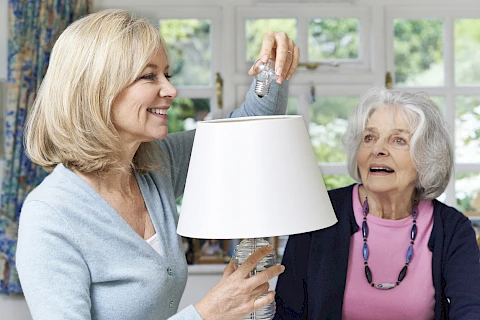
Accidents at home are a leading cause of injury among seniors. Falls, fires, and other hazards can lead to severe consequences. As a caregiver, your role involves more than just companionship; you also help create a safe and supportive environment. Proactive safety assessments can prevent accidents and enhance the quality of life for those you care for.
Room-By-Room Safety Checklist
Let's break down potential hazards by room and offer practical solutions.
1. Living Room
The living room is a space for relaxation and socializing, but it can pose risks. Common hazards include clutter, loose rugs, and tangled electrical cords. Declutter the space regularly, remove loose rugs, and organize cords to prevent tripping hazards. Store often-used items within easy reach, and secure tall bookcases to the wall to prevent them from toppling over.
2. Kitchen
While a hub of activity, the kitchen presents numerous dangers. Slippery floors, sharp objects, and fire risks are prevalent. Ensure sharp objects are stored safely, and install smoke detectors to alert in case of fire. Install permanent non-slip flooring, and store often-used items within easy reach.
3. Bathroom
Bathrooms are notorious for slips and falls. Wet floors and the absence of support bars are typical hazards. Installing grab bars, permanent non-slip flooring, and raised toilet seats can significantly reduce these risks. Keep a laundry hamper nearby for towels so they don't end up on the floor, becoming trip hazards.
4. Bedroom
The bedroom should be a sanctuary for rest and relaxation. Watch out for poor lighting and beds that are difficult to access. Add nightlights and use bed rails for added safety. Ensure there are light switches near the bed, or consider using voice-activated lighting systems.
5. Hallways and Stairs
These areas often contribute to accidents if not properly maintained. Poor lighting and uneven steps pose serious dangers. Keep these high-traffic areas clutter-free. Consider installing handrails and stair lifts, improving lighting, and adding stair treads for better grip.
Identify and Mitigate Common Hazards
Regularly checking for risks can prevent incidents. To prevent fires, regularly inspect older appliances and ensure smoke detectors are functioning properly. Purchase and maintain fire extinguishers, and ensure the senior staff member knows how to use them. Have an emergency plan in place in case of a fire. To avoid poisoning, ensure medications are clearly labeled and stored responsibly to avoid accidental ingestion.
Have Safety Discussions With Seniors
Discussing safety can be sensitive. Approach these talks with respect and kindness. Start by acknowledging their independence and showing that you value their input. Use clear and supportive language to discuss any concerns you may have. Encourage seniors to participate in decision-making to foster cooperation and acceptance.
Need Help With Light Housework?
Making home safety assessments a part of regular caregiving routines can significantly enhance the well-being of seniors. By following the room-by-room checklist and addressing common hazards, you can help them live in a safer home environment.
Does your senior loved one need assistance with household chores and personal care tasks? Senior Helpers Warren is ready to support seniors and their caregivers in the Erie, Warren, Millcreek, Chandlers Valley, and Clarendon areas. Contact us today. Your proactive approach makes all the difference.